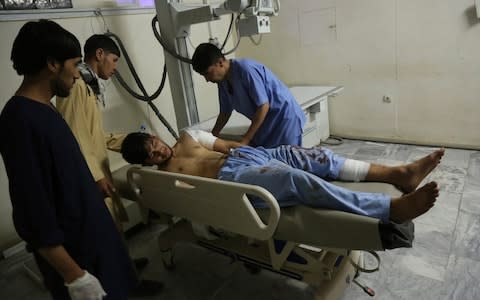Islamic State bomber kills 63 at Afghan wedding in worst attack in months

An Islamic State group suicide bomber killed at least 63 and wounded scores when he detonated in crowds at a Kabul wedding feast, in the most deadly attack in Afghanistan this year.
The scale of the carnage in a western Shia district of the Afghan capital was met with shock in a city frequently hit by suicide attacks. It underlined fears that a peace deal between America and the Taliban will not halt violence.
America called the bombing “an act of extreme depravity”, while the Taliban, who have themselves regularly killed civilians in indiscriminate bombings, said it was barbaric.
A bomber called Abu Assim al Pakistani blew himself up after infiltrating a gathering of “infidels”, according to the Afghan branch of the Islamic State group. Afghan Shia Muslims have repeatedly been hit by the group before.
The blast tore through crowds of well wishers and relatives, the groom told local television. He had welcomed guests to the venue called the Dubai City wedding hall, only to see their bodies being carried back out hours later.

The attack "changed my happiness to sorrow", said the young man, who gave his name as Mirwais.
"My family, my bride are in shock, they cannot even speak. My bride keeps fainting," he said. "I lost my brother, I lost my friends, I lost my relatives. I will never see happiness in my life again.”
Ashraf Ghani, the Afghan president, condemned “the inhumane attack on the wedding hall in Kabul last night. My top priority for now is to reach out to the families of victims of this barbaric attack.”
He said the Taliban movement fighting his government “cannot absolve themselves of blame, for they provide platform for terrorists”.
The blast came as American and Taliban envoys continue to try to reach a deal which will see US troops withdraw and the Taliban give guarantees that Afghanistan will not become a haven for transnational terrorists such as al-Qaeda.

Saturday night's blast underlined how difficult that may be, with the local branch of Islamic State in Iraq and Levant (Isil) still controlling a foothold in eastern Afghanistan.
Kabul's gaudy wedding halls hold lavish celebrations as families save for years to show off their hospitality and largesse. Guest lists can often run to more than a thousand. The purpose-built venues also hold other gathering such as political rallies. Several have been bombed in recent years and they have come to be seen as a soft target.
Pictures of the aftermath of Saturday night's blast showed bodies strewn among overturned chairs and tables. Witnesses said the bomb detonated near a stage holding musicians. "The wedding guests were dancing and celebrating the party when the blast happened," a 23-year-old guest called Munir Ahmad told AFP.
"Following the explosion, there was total chaos. Everyone was screaming and crying for their loved ones.”
At least 185 were wounded in the blast, including many women and children.
Isil first emerged in Afghanistan in early 2015, as existing militants swarmed to the banner of extremists who had shocked the world by proclaiming a caliphate in Iraq and Syria.
The Afghan branch of the movement has endured even as the middle eastern caliphate has been swept away in the Middle East. It has built a stronghold in Nangarhar and parts of Kunar, attracting defections from existing extremist groups already present, including the Pakistan Taliban, and a scattering of foreign fighters.
An intense American special operations campaign has failed to dislodge Isil and Taliban attempts to purge the group from eastern Afghanistan have also failed.

 Yahoo News
Yahoo News 
